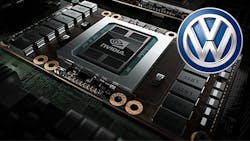VW, Uber Set to Deploy Nvidia’s Tech for Self-Driving Cars
Trying to spread its industry-leading graphics chip technology into new areas, Nvidia Corp. said Uber Technologies Inc. and Volkswagen AG will use its artificial intelligence expertise to help bring self-driving cars to the roads.
Uber, the largest ride-hailing company, will use Nvidia processors and software for its forthcoming fleet of self-driving vehicles, the chipmaker’s CEO Jen-Hsun Huang said at CES on Sunday in Las Vegas. Volkswagen will deploy Nvidia technology to develop an intelligent co-pilot system, the companies said, and Huang was joined on stage by VW brand chief Herbert Diess.
Nvidia is touting the tie-ups as a way of claiming leadership in the growing competition among component makers for whose technology will dominate the emerging field of self-driving cars. Rival chipmakers such as Intel Corp. and Qualcomm Inc. have also said their technology will be the key ingredient in new systems. Meanwhile automakers have announced collaborations with multiple companies as they try to work out what’s the best way to remove the need for drivers.
“The map is almost everyone working with everyone,” said Danny Shapiro, who heads Nvidia’s automotive business. “We’re happy with our position, with the 320 partners we have.”
Uber has been working on self-driving car trials since 2015 and has completed 50,000 passenger trips over 2 million autonomous miles. Uber began using Nvidia chips in its first test fleet of Volvo SUVs, the companies said.
Volkswagen and Nvidia’s co-piloting system will provide convenience and assistance features using sensors inside and outside the vehicle. The artificial intelligence capabilities will improve the system over time. Such features may include the ability to recognize when a driver is drowsy or distracted and keep the car smoothly running in the proper lane at the right speed for the conditions.
The companies didn’t provide financial details about the partnerships.
By Ian King
About the Author
Bloomberg
Licensed content from Bloomberg, copyright 2016.
